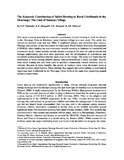The economic contribution of safari hunting to rural livelihoods in the Okavango: The case of Sankuyo village

View/
Date
2005Author
Thakadu, O.T.
Mangadi, K.T.
Bernard, F.E.
Mbaiwa, J.E.
Publisher
Botswana SocietyType
Published ArticleMetadata
Show full item recordAbstract
This study aimed at assessing the economic contribution of safari hunting to rural livelihoods
in the Okavango Delta in Botswana, using Sankuyo village as a case study. This study was carried out between June and July 2004. It employed primary and secondary data sources. Findings indicate that, within the context of Community Based Natural Resources Management (CBNRM), safari hunting has socio-economic benefits accruing to Sankuyo (at household and
community level). These benefits include income(coming in the form of cash dividends and through employment) that have been generated, and the development of recreational and
household sanitation facilities that has taken place in the village. The study also found that the
distribution of safari hunting benefits among Sankuyo households is fairly equitable. Income
from safari hunting has also been used to purchase communally owned resources such as
vehicles. Because of these benefits, the people of Sankuyo have since developed positive
attitudes towards safari hunting. These findings thus suggest that safari hunting is important in
improving rural livelihoods in the Okavango Delta while at the same time promoting natural resource conservation.
Collections
- Research articles (ORI) [270]
